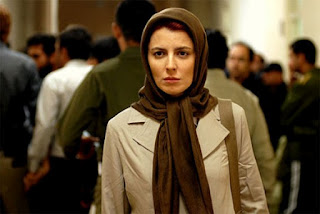There are few movies which remain
etched in the collective conscience of its audience long after they have been
watched. These movies provoke thought, elicit questions and provide no easy
answers. A Separation, the Iranian
film which won the Academy Award for the Best Foreign Language Film at the 2012
Oscars, is one such movie.
A Separation is a courageous attempt, given the circumstances of
cultural and artistic repression that exist in Iran. It is a movie about a
crumbling marriage between Simin (Leila Hatami) and Nader (Peyman Moaadi). Simin
wants to leave the country in order to create a better life for their daughter Termeh
(Sarina Farhadi), but Nader is committed to staying back in Tehran to look
after his ailing father who is suffering from Alzheimer’s. In the opening
scene, the couple looks directly into the camera and pleads their case to a
judge, an imaginary substitute for the audience. It is this incident that
precedes the dissolution of their marriage and triggers off a series of events.
Director Asghar Farhadi
Film trailer
Nader hires a maid named Razieh
(Sareh Bayat), a deeply pious woman, to look after his father. Razieh has a
young daughter and is carrying another child along the way. She works to ease
the financial burden of her debt-ridden husband. However, after a fateful
incident, she loses her child. Subsequently, the characters in the movie grapple
with law, religion and human sentiment to find out who should be held
responsible for the loss of the child.
When A Separation is placed in the context of the Iranian New Wave, one
can see a metamorphosis of this cinematic movement which began in 1969. Gone is
the world of Majid Majidi, Kiarostami or Jafar Panhai, where we see reality from
the redeeming and innocent eyes of children.
The director Asghar Farhadi’s
camera work is to be admired and studied. The mis-en-scence is crafted to
externally depict the inner conflicts of the characters. The editing of the
film, with ample cut aways and jump cuts is perfect and seamless. The shots
also depict the class conflict that exists in Tehran, represented by the differences
in the colourful and upper-middle class apartment of Nader to the run-down and
poverty-ridden residence of Razieh.
- Parinitha Shinde








